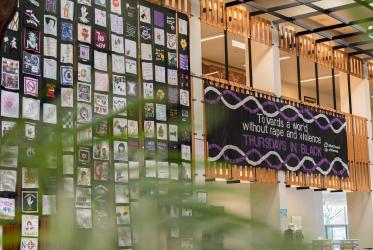From webinars to prayer services, from formal statements to heartfelt utterances and Thursdays in Black photos on social media, the World Council of Churches family has creatively observed the 16 Days campaign, which began on 25 November and ended on 10 December, Human Rights Day.
A glimpse of a few among many initiatives…
In Pakistan, the Society for Peace and Sustainable Development held a solidarity prayer for victims of rape and violence on 3 December at St Mary’s Church of Pakistan (Multan Diocese), at Muzaffargarh. About 20 women, men, and children participated, and they also resolved that, every Thursday, women will gather to safely discuss violence and rape happening around them, and take some concrete actions in addition to praying together.
“The most difficult and challenging task was to share, think, discuss and elaborate the violence and rape issue beyond cultural and taboo boundaries,” said Rev. Rufus Kamran, executive director of the Society for Peace and Sustainable Development-Pakistan.
The Uniting Presbyterian Church in Southern Africa issued a special statement on the 16 Days campaign. “We will challenge all our practices, laws, polices, liturgies—including prayers and the use of pulpits where gender inequality is perpetuated,” reads the statement, which contains a list of commitments from the Uniting Presbyterian Church in Southern Africa. “We will promote a culture where all our congregations will be safe havens, places that are overflowing with love, where all are safe and are welcomed.”
While the church recognizes diversity, it also pledges not to promote division. “We will always promote cohesion,” reads the text. “We are a reconciled community of believers.”
The Anglican Communion produced a five-part webinar series that covered topics such as helping people identify the signs of domestic abuse; addressing gender-based violence around the communion; engaging men in ending gender-based violence; and how our theology engages us and motivates us to act.
Those efforts struck a very personal chord with communication director Gavin Drake, widower of Jill Saward, who was a committed advocate for victims and survivors of gender-based violence for 30 years. "Her campaign started after she was raped by a gang of burglars in her home – a west London vicarage – at the age of 21 in 1986,” said Drake. “During the attack, she prayed to God for strength to survive. The campaign that she ran was her ‘thank you’ to God for her survival.”
When Saward died in January 2017, much had been achieved, said Drake. “Many laws in the UK have been changed as a direct result of her case and her campaign,” he said. “But there was much still to do. The Jill Saward Organisation will continue her campaign and be an advocate for victims and survivors.”
The organisation will also complete her work on “When I needed a neighbour,” a teaching document and resource for churches. "The church can’t be silent on this issue,” said Drake. "With statistics showing one in three women falling victim to some form of gender-based violence, churches will be full of victims and survivors. They need support. The church can help provide it.”
World Council of Churches staff and friends prayed and reflected each day under the theme “From Our House to Yours.” Bible studies and prayers focused on the impact of sexual and gender-based violence in the contexts of work and ministry.
They reflected on questions such as: "How can communities and churches be places where women find support in their leadership models?”
One prayer of intercession read: “Where women and young children cry ‘No, no!’ and are unheeded by their oppressors. Come, Holy Spirit, hear us and heal us!”
Ecumenical Centre prayers and reflections from 16 Days against gender-based violence








